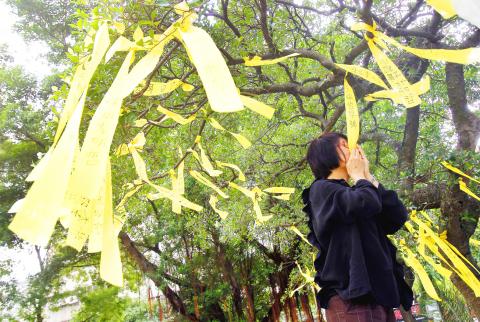Taiwanese human rights advocates yesterday called on US President Donald Trump to use his visit to Beijing this week to ask for the release of detained democracy advocate Lee Ming-che (李明哲).
Trump should raise Lee’s case when meeting Chinese President Xi Jinping (習近平) following his arrival in Beijing today, the advocates said.
“We think US government departments and especially the president at the top should express their concern,” said Eeling Chiu (邱伊翎), a representative from an alliance of more than 10 Taiwanese rights groups that organized a campaign pressing for Lee’s release that began yesterday. “The president should express his views.”

Photo: AP / Chiang Ying-ying
In June the US Congressional Executive Commission on China added Lee to a database of people it considers political prisoners.
“We of course hope from a human rights point of view that the United States, as one of the world’s most important rights defenders, will pay attention not just to the Lee Ming-che case, but possibly bring up others” in meetings with Xi, Covenants Watch chief executive officer Huang Yi-bee (黃怡碧) said.
Trump’s talks with Xi are expected to center on trade disputes and reining in North Korea’s nuclear weapons program and it is unclear whether he plans to raise human rights concerns.
The writers’ organization PEN America has urged him to ask China to free the widow of Nobel Peace Prize winner Liu Xiaobo (劉曉波), Liu Xia (劉霞), from house arrest.
That followed a letter signed by literary luminaries such as Margaret Atwood and Philip Roth calling on China to remove restrictions on Liu Xia’s freedom of movement and allow her to meet freely with whomever she wishes.
At yesterday’s inaugural event, organizers stood under a tree festooned with ribbons to chant “Lee Ming-che is innocent” and “Free Lee Ming-che.”
“No matter what laws China uses, the Lee Ming-che case needs to be closed as soon as possible,” Judicial Reform Foundation director Kao Jung-chih (高榮志) said.
“We think Lee Ming-che is a political prisoner,” Kao said. “What he did is something we all do in our daily lives, whether it’s Taiwan society or Chinese society, which is to express our own ideas and views.”

A Ministry of Foreign Affairs official yesterday said that a delegation that visited China for an APEC meeting did not receive any kind of treatment that downgraded Taiwan’s sovereignty. Department of International Organizations Director-General Jonathan Sun (孫儉元) said that he and a group of ministry officials visited Shenzhen, China, to attend the APEC Informal Senior Officials’ Meeting last month. The trip went “smoothly and safely” for all Taiwanese delegates, as the Chinese side arranged the trip in accordance with long-standing practices, Sun said at the ministry’s weekly briefing. The Taiwanese group did not encounter any political suppression, he said. Sun made the remarks when

The Taiwanese passport ranked 33rd in a global listing of passports by convenience this month, rising three places from last month’s ranking, but matching its position in January last year. The Henley Passport Index, an international ranking of passports by the number of designations its holder can travel to without a visa, showed that the Taiwan passport enables holders to travel to 139 countries and territories without a visa. Singapore’s passport was ranked the most powerful with visa-free access to 192 destinations out of 227, according to the index published on Tuesday by UK-based migration investment consultancy firm Henley and Partners. Japan’s and

BROAD AGREEMENT: The two are nearing a trade deal to reduce Taiwan’s tariff to 15% and a commitment for TSMC to build five more fabs, a ‘New York Times’ report said Taiwan and the US have reached a broad consensus on a trade deal, the Executive Yuan’s Office of Trade Negotiations said yesterday, after a report said that Washington is set to reduce Taiwan’s tariff rate to 15 percent. The New York Times on Monday reported that the two nations are nearing a trade deal to reduce Taiwan’s tariff rate to 15 percent and commit Taiwan Semiconductor Manufacturing Co (TSMC, 台積電) to building at least five more facilities in the US. “The agreement, which has been under negotiation for months, is being legally scrubbed and could be announced this month,” the paper said,

MIXED SOURCING: While Taiwan is expanding domestic production, it also sources munitions overseas, as some, like M855 rounds, are cheaper than locally made ones Taiwan and the US plan to jointly produce 155mm artillery shells, as the munition is in high demand due to the Ukraine-Russia war and should be useful in Taiwan’s self-defense, Armaments Bureau Director-General Lieutenant General Lin Wen-hsiang (林文祥) told lawmakers in Taipei yesterday. Lin was responding to questions about Taiwan’s partnership with allies in producing munitions at a meeting of the legislature’s Foreign Affairs and National Defense Committee. Given the intense demand for 155mm artillery shells in Ukraine’s defense against the Russian invasion, and in light of Taiwan’s own defensive needs, Taipei and Washington plan to jointly produce 155mm shells, said Lin,